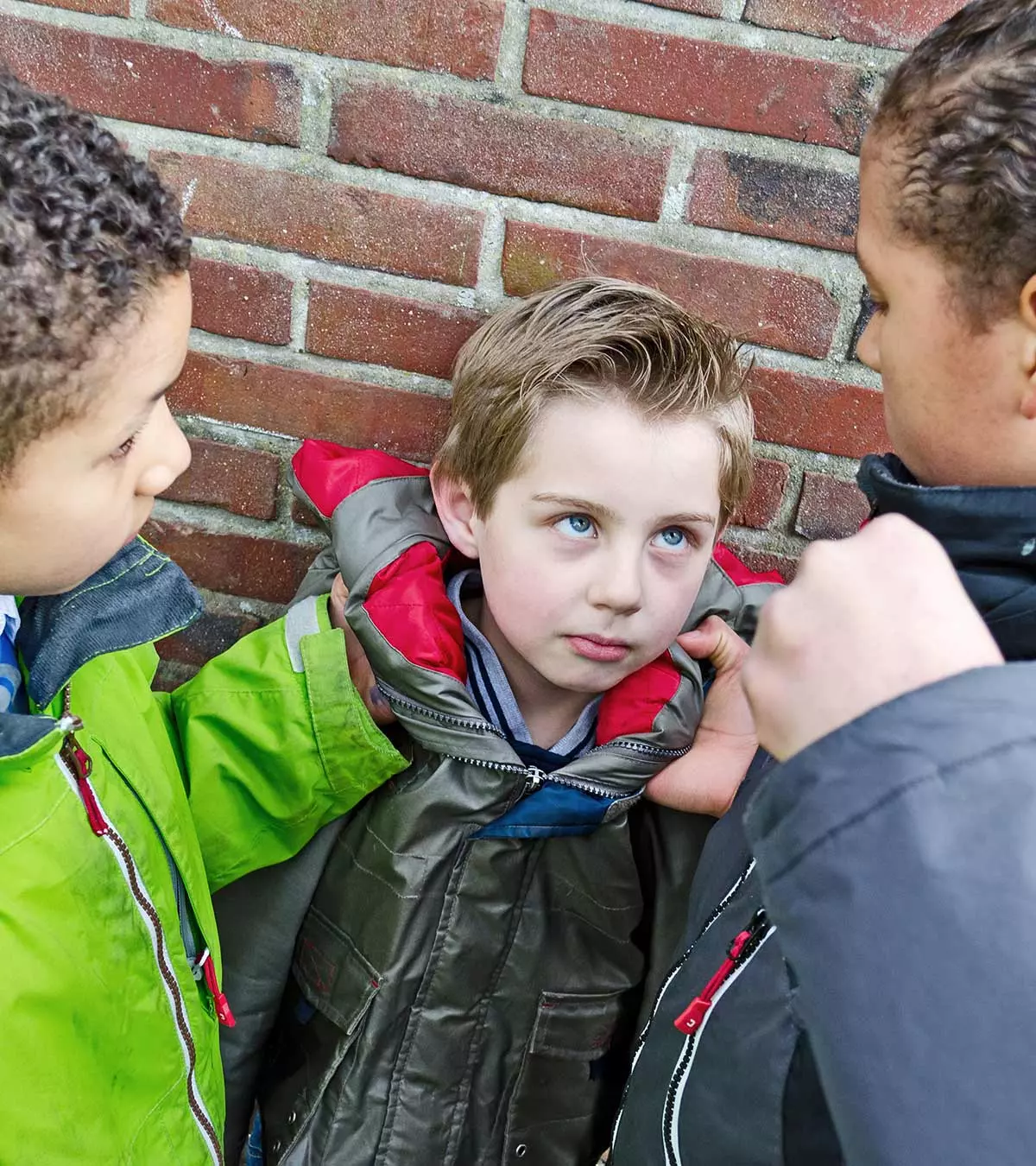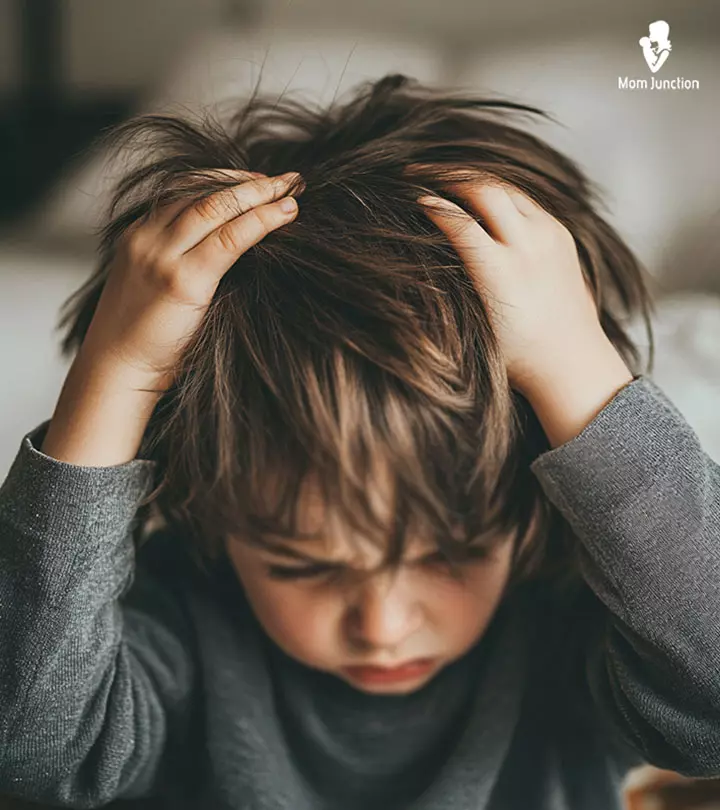
Image: ShutterStock

With some famous personalities like Bill Gates and Mark Zuckerberg dropping out of their schools, it may not be surprising if you hear that your child wants to do it too. Every year around 1.2 million kids drop out of school in the US (1). Children discontinue schooling for various reasons, and knowing the different reasons is essential for creating effective solutions. Dropping out affects not only the child’s future but also brings challenges for families and society in the form of higher unemployment rates and social problems. Read on as we tell you the possible reasons for kids abandoning their education and some effective ways for dropout prevention.
Key Pointers
- Negative influences, such as alcohol, drugs, or excessive internet use, may distract children.
- Academic difficulties, bad grades, and poor academic performance can all contribute to dropping out.
- Children from low-income homes may need to work to support their families or care for siblings.
- Retention, or being held back a grade, can undermine a child’s self-esteem.
- Chronic illnesses can affect a child’s ability to acquire knowledge and finish school.
- Students might lose interest in school because of boredom or a teacher’s reluctance to motivate them.
Why Do Kids Drop Out Of School?
, a behavioral neuroscientist from San Francisco Bay Area, says, “The risk factors for dropping out of school may include having mental health issues (students are half as likely to graduate), having a disability (36% drop out rate), absenteeism, poor grades, and poor exam performance.”
Some of the most probable reasons why children drop out of school are as follows:
1. Bad Influence

Image: Shutterstock
Bad influence on children is the most common reason for kids dropping out of school. Substance abuse due to early or unlimited exposure to alcohol, drugs, the internet, peer pressure, and television can distract children from pursuing academics and initiate them into antisocial activities instead.
2. Academic Difficulty
The inability to cope with academic pressure and learning difficulties are other reasons for kids to opt out of school. Studies prove that kids who do not read proficiently by fourth grade are four times more likely to drop out of school. Studies also reinstate the fact that students who fail in math and English in the eighth grade are 75% more likely to drop out of high school.
 Point to consider
Point to consider3. Family And Socio-Economic Needs

Image: Shutterstock
Research reveals that students belonging to low-income groups or having a low socioeconomic status are more likely to drop out of school. They may have to work to support their family. Some children may need to stay back at home to take care of their siblings while the parents go out to work.
Divorce or separation of parents and an unhealthy home environment can also adversely affect the education of children.
The graph interprets the school dropout rates of 16- to 24-year-olds varied by race/ethnicity as recorded between 2010 to 2025. According to the data, the average dropout rates decreased in 2025 compared to 2010 (4). A major difference was witnessed in the Hispanic population followed by the Black population.

Dropout rates of 16- to 24-year-olds in the US, by race/ethnicity
Source: The National Center for Education Statistics (NCES)4. Poor Health:
The health of a child greatly affects his learning ability and performance at school. Illnesses that occur during childhood and continue life long may curb a child’s ability to complete school.
5. Retention:
Retention has a negative impact on the self-esteem of children. They feel bad being older than their classmates and tend to drop out of school.
6. Disengagement:

Image: Shutterstock
Many kids find the school culture boring. According to a study, almost 71% of students become disinterested in high school while they are in the 9th and 10th grades. They prefer to go late to school, skip classes and take long lunch breaks. The lack of interest often leads to dropping out of school. Some students find it difficult to connect with the teacher. A majority of students did not feel their teachers motivated them enough to work hard.
7. Transition:
Studies indicate that a transition from the cohesive environment of middle school to the anonymity of high school may take a toll on the academic interest and school performance of students. The relationship with the teachers is not as strong as it was in middle school. It may demotivate students and make them lose interest in studies.
Additionally, some kids may drop out due to issues related to the education system itself. For example, some families may choose to pursue homeschooling instead of traditional schooling due to dissatisfaction with education policy or education reform. Other students may struggle to find the right fit for their interests and abilities within the traditional academic curriculum and may benefit from vocational training programs. For students who have already dropped out, dropout recovery programs can provide an opportunity to earn a high school diploma and improve high school graduation rates. Overall, addressing these various factors is crucial in reducing the number of students who drop out of school.
How To Prevent Your Child From Dropping Out Of School?

Image: Shutterstock
You can easily prevent children from dropping out of high school or college by following some simple tips.
1.Get Involved:
Parental involvement is a major factor that motivates a child to succeed at school. Keep track of your child’s academic achievement, so that you can help them improve their grades. Also, look into child behavior problems and solutions to offer whatever help your child needs.
 Quick fact
Quick fact2. Have realistic expectations
Encourage and motivate your child to perform well in school. However, do not have unrealistic expectations from your child. It may cause undue stress to your child and lead to disastrous academic performance, poor school attendance, and truancy.
3. Take the help of community organizations
Community organizations can help address the root challenges children face by offering mentorship, after-school tutoring, and mental health resources.
Frequently Asked Questions
1. Are there any warning signs that a child may drop out of school?
Warning signs that a child may drop out of school include remaining absent from school, poor grades, involvement in disciplinary issues, a history of frequent transfers, low self-esteem, and having adult responsibilities such as caring for a sibling or their child (5).
2. What are the consequences of dropping out of school on society?
The consequences of dropping out of school on society are significant. School dropouts may not have the potential to secure well-paying jobs and may experience unemployment. Additionally, they may have poor health outcomes, behavioral problems and be more likely to engage in criminal activities. These factors impact the individual and have a broader impact on society.
3. What are some alternative education options for kids who have dropped out of school?
If circumstances restrict children from attending school, they may consider alternative education options. These include homeschooling, online learning programs, adult education programs, and alternative schooling with a different curriculum and approach to teaching and learning than traditional schools and accommodating children whose needs are not addressed by other schools.
4. How can schools better support students to ensure they don’t drop out?
Schools can help students avoid dropping out by providing individual attention and emotional support, personalized learning opportunities, promoting open communication through regular counseling, and encouraging safe and inclusive surroundings.
5. How can teachers help prevent students from dropping out of school?
Teachers can make lessons more exciting for children, give vulnerable students personal attention, and maintain regular communication with both the students and parents. They’re crucial in spotting students at risk of dropping out.
Academic difficulties and the family’s economic needs are two of the most common reasons kids drop out of school. In some cases, it might also be due to problems of adolescence or the company of bad friends. However, not having a basic education might not have a good impact on a child’s future since it limits their employment opportunities. Therefore, it is advised that you get involved and support your child to ensure they complete their education. Eventually, it will help them have adequate opportunities to lead a happy and healthy life.
What types of intervention programs are effective in preventing student dropout?
Dr. Grill suggests intervention programs such as mental health programs, especially if they are preventative. “Preventative programs support students through education, skill building, and stigma reduction approaches.”
Infographic: How To Prevent Your Child From Dropping Out Of School
Dropping out of school can have long-lasting consequences on a child and their family’s future. Thus, parents must take steps to prevent their children from quitting school. Read our infographic to find effective strategies to support your child in staying on track to graduate and achieve academic success.
Some thing wrong with infographic shortcode. please verify shortcode syntax
Illustration: Most Common Reasons Kids Drop Out of School

Image: Dalle E/MomJunction Design Team
References
- Fast Facts: Dropout Rates
https://nces.ed.gov/fastfacts/display.asp?id=16 - Some of the Surprising Reasons Why Students Drop Out of School.
https://www.nea.org/nea-today/all-news-articles/some-surprising-reasons-why-students-drop-out-school - Special Report Why Students Drop Out.
https://www.ascd.org/el/articles/why-students-drop-out - Status Dropout Rates
https://nces.ed.gov/programs/coe/indicator/coj/status-dropout-rates#:~:text=In%202020%2C%20there%20were%202.0,Current%20Population%20Survey%20(CPS). - Early Warning Indicators.
https://nap.nationalacademies.org/read/13035/chapter/7.
Community Experiences
Join the conversation and become a part of our nurturing community! Share your stories, experiences, and insights to connect with fellow parents.
Read full bio of Beth Sullivan
- Katherine Grill is the CEO and co-founder of Neolth, a technology company that provides personalized mental health support. Previously she worked at Children's National Pediatric Hospital. She did her MA in Psychology and Ph.D. in Behavioral Neuroscience and was selected for Forbes 30 Under 30 list in the 2022 education category.
 Katherine Grill is the CEO and co-founder of Neolth, a technology company that provides personalized mental health support. Previously she worked at Children's National Pediatric Hospital. She did her MA in Psychology and Ph.D. in Behavioral Neuroscience and was selected for Forbes 30 Under 30 list in the 2022 education category.
Katherine Grill is the CEO and co-founder of Neolth, a technology company that provides personalized mental health support. Previously she worked at Children's National Pediatric Hospital. She did her MA in Psychology and Ph.D. in Behavioral Neuroscience and was selected for Forbes 30 Under 30 list in the 2022 education category.
Read full bio of Harshita Makvana
Read full bio of Swati Patwal
Read full bio of Kavita Kankani

















